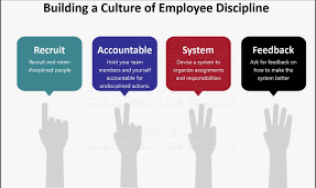By Patrick Cahillane – Life, Executive & Business Coach with One Source International Coaching and Training ( One Source International Coaching & Training ) & Founder of The One Source Business Development Network

As a business coach, one of the key challenges faced by managers and leaders is maintaining discipline within their teams. While discipline may be seen as a negative term, it plays a vital role in fostering a culture of accountability and driving performance. When approached with fairness, empathy, and clear communication, employee discipline can serve as a powerful tool for growth and development. In this blog post, we will explore effective strategies for disciplining employees that strike a balance between correction and support, ultimately leading to improved performance and a harmonious work environment.
- Set Clear Expectations:
Discipline begins with setting clear expectations. Ensure that your employees have a clear understanding of their roles, responsibilities, and performance standards. Establish measurable goals and communicate them effectively, leaving no room for ambiguity. By aligning expectations, you provide a foundation for accountability, making it easier to address any deviations.
- Provide Constructive Feedback:
When addressing performance issues, it is essential to provide constructive feedback that focuses on specific behaviors or outcomes. Use the “feedback sandwich” approach, where you start with positive reinforcement, address the areas requiring improvement, and end on a positive note. This approach helps maintain the employee’s self-esteem while also highlighting areas for growth and development.
- Utilize Progressive Discipline:
Progressive discipline is a step-by-step approach that offers employees an opportunity to correct their behavior before severe consequences are imposed. It typically includes verbal warnings, written warnings, performance improvement plans, and, if necessary, more serious actions such as suspensions or terminations. This approach ensures fairness and provides a clear pathway for employees to rectify their actions and improve their performance.
- Focus on Coaching and Training:
Effective discipline goes beyond punishment; it involves coaching and providing the necessary resources for employees to succeed. Identify areas where additional training or support may be required and offer guidance to help employees bridge the skill or knowledge gaps. When employees feel supported in their growth, they are more likely to respond positively to discipline and make the necessary improvements.
- Encourage Self-Reflection and Ownership:
During the disciplinary process, encourage employees to reflect on their actions and take ownership of their mistakes. Allow them the opportunity to express their perspective and provide input on potential solutions. This approach promotes self-awareness and empowers employees to actively participate in their own development, fostering a sense of accountability.
- Communicate Consequences Clearly:
When disciplinary measures are necessary, it is crucial to communicate the consequences clearly. Be transparent about the potential outcomes and the steps that will be taken if the required improvements are not made. By setting clear boundaries and expectations, employees understand the gravity of the situation and are motivated to make the necessary changes.
- Follow Due Process and Document:
Ensure that the disciplinary process follows established company policies and procedures. Document all incidents, conversations, warnings, and improvement plans, maintaining a detailed record of the entire process. This documentation serves as a reference for future actions, helps track progress, and provides legal protection if needed.
Remember:
Disciplining employees is a delicate process that requires a balanced approach of correction, support, and accountability. By setting clear expectations, providing constructive feedback, utilizing progressive discipline, and focusing on coaching and training, you can guide your employees toward improved performance and growth. Encourage self-reflection, maintain open lines of communication, and follow due process to foster a fair and transparent disciplinary process. Ultimately, effective discipline contributes to a positive work culture, increased productivity, and the success of both individuals and the organization as a whole.
